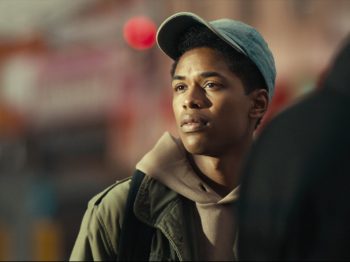

There are two separate and distinctly different tones in this film, directed by Anthony Mandler and written by Radha Blank, Cole Wiley and Janece Shaffer, based on the novel by Walter Dean Myers, and, although there are moments when the film’s  intentions are overly spoon-fed to the audience, the overall effectiveness is quite palpable. The structure of the film is built on the before-and-after for Steve, and the two tones of the film are clearly delineated between the two. Before his arrest, we get to know Steve as a regular teenage boy who has friends, a great family, a girlfriend, and big dreams of being a filmmaker. He sees the world through a camera, filming and photographing everything, making an impression on his adult film club teacher at his prestigious high school. This kid has it all, a bright future built on a solid foundation. There’s only one thing seemingly working against him, and that’s the fact that he’s a black man in America. So, when Steve gets arrested for being part of a robbery-turned-murder, it’s easy to swipe aside everything else and paint him with that one, single brush. Such is the point of Monster, and, in a post-George Floyd world, it hits home louder than ever.
intentions are overly spoon-fed to the audience, the overall effectiveness is quite palpable. The structure of the film is built on the before-and-after for Steve, and the two tones of the film are clearly delineated between the two. Before his arrest, we get to know Steve as a regular teenage boy who has friends, a great family, a girlfriend, and big dreams of being a filmmaker. He sees the world through a camera, filming and photographing everything, making an impression on his adult film club teacher at his prestigious high school. This kid has it all, a bright future built on a solid foundation. There’s only one thing seemingly working against him, and that’s the fact that he’s a black man in America. So, when Steve gets arrested for being part of a robbery-turned-murder, it’s easy to swipe aside everything else and paint him with that one, single brush. Such is the point of Monster, and, in a post-George Floyd world, it hits home louder than ever.
While Monster is a clear indictment of an American legal system that does not afford young, black men the luxurious right of being presumed innocent, it also works quite well as a narrative plot, filling in the story of what really happened in sequences of flashbacks, designed to help us understand Steve’s world view and the path he found himself on that led him to being on trial for his life. The profound statement of this film isn’t just that the system pre-judges anyone with darkened skin, it’s how difficult it is for a young man of color to avoid circumstances that would put him into that system in the first place.
In effective voiceover narration, Steve describes his life as if it were a movie, detailing the moments in his life that would be those for any normal teenager. Teenagers make bad decisions, they befriend bad people, they break small laws, but, when you are a young, black man in Harlem, some of these decisions that would be no more than a bad memory for a white teen, end up putting you at the mercy of a judicial system that, from top to bottom, is built on a history of institutionalized bigotry at worst, unconscious racism at best. It’s understandable to see Radha Blank listed as one of the writers of Monster, a writer/actress/director whose feature film debut, The Forty-Year-Old Version, was one of the boldest and best films of 2020 and presented yet another perspective on being black in America.
It’s also clear that the power and effectiveness of Monster lies in the performance given by Kelvin Harrison, Jr, as Steve. Harrison, Jr., one of America’s best young actors, delivered two of the best performances of the decade in Luce (2019) and Waves (2019), and he is no less powerful in Monster, playing a kid who is forced to grow up way too fast and face the consequences of being a black man in America in the harshest way possible. The rest of the cast is buoyed by great performances from Jeffrey Wright as Steve’s equally confused and overwhelmed father, Jennifer Hudson as Steve’s mother, plus ASAP Rocky and John David Washington as the two neighborhood gang members who befriend Steve. It’s a pleasure seeing Tim Blake Nelson, who plays Steve’s supportive teacher, play a regular guy, for a change, and Jennifer Ehle as Steve’s well-intentioned but pessimistic lawyer.
The cinematography by David Devlin is exceptional, as the vivid colors and soft, warm hues of Steve’s life “before” paints a beautiful picture of Steve’s talents and dreams, and the monochrome, bare coldness of the jail and the courthouse reveal the haunting juxtaposition between Steve’s life and the nightmare he has stumbled into.
It’s impossible to know how this film would have played if it had been released three years ago, but it is difficult not to watch Monster through the prism of George Floyd and the Black Lives Matter movement. While Monster’s effectiveness might be a little dulled because of an especially heightened awareness of institutionalized racism in this country, that should not dissuade you from giving this film a chance. Monster may feel preachy and familiar, but just below the surface is a personal and well-told story of one young man and his complicated relationship with the world around him, one that is certainly worth experiencing.
Originally published on Awards Radar.
